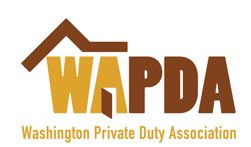The biggest change to regulations affecting private duty home care agencies in 25 years is slated to begin in just 3 months. But many questions remain about what the requirements will look like and even if they will be implemented at all come next January.
Initiative-1029 was the hot topic of discussion at this year’s WAPDA (Washington Private Duty Association) annual conference. Despite excellent presentations by the state Department of Health (DOH) and the Department of Social and Health Services (DSHS), many participants came away with a sense of anger and/or gloom as the uncertainty and harsh requirements of the initiative are now looming closer. Participant discussions seemed to fall into a few distinct categories:
1. Will I-1029 be implemented on schedule? It seems far fetched that the state would choose to spend $48 million on a new set of complicated and controversial training and certification requirements for home care aides. Two weeks ago the governor ordered a 6%+ across the board budget cut. More cuts may be coming in October with still more to come after that depending on how voters this November deal with various tax-related initiatives on the ballot. A new state fiscal projection comes out toward the end of the year with economists already projecting still lower state revenues. The Governor will publish her budget for the 2011–13 biennium in December, and then we’ll see. Will Olympia really make further cuts to health, education, roads, and social services but keep these new training and certification requirements on track? Hard to believe, but we’ve been wrong before.
2. Will DOH and DSHS be ready to implement I-1029 on schedule? The 6%+ budget cuts already ordered by the governor will further squeeze essential programs at DOH and DSHS. At what point will they no longer be able to reasonably conclude that they’re able to finish writing the regulations and administer this brand new program including dealing with the inevitable glitches that will occur? The CR-103, which DSHS was supposed to publish on October 1, has been delayed. How long can it be delayed and still give DSHS the time it needs before the new regulations take effect?
3. What will private duty agencies do if the initiative goes ahead as scheduled? In a survey WAPDA conducted at the conference, the vast majority of home care owners/administrators did not know when they would be ready for implementation, did not express confidence they could provide the training themselves, or know where they could send prospective non-exempt new hires for training. Even if these new hires do get the training within the allotted 120-hour time period, the test could keep 25% or more from receiving their certificate.






